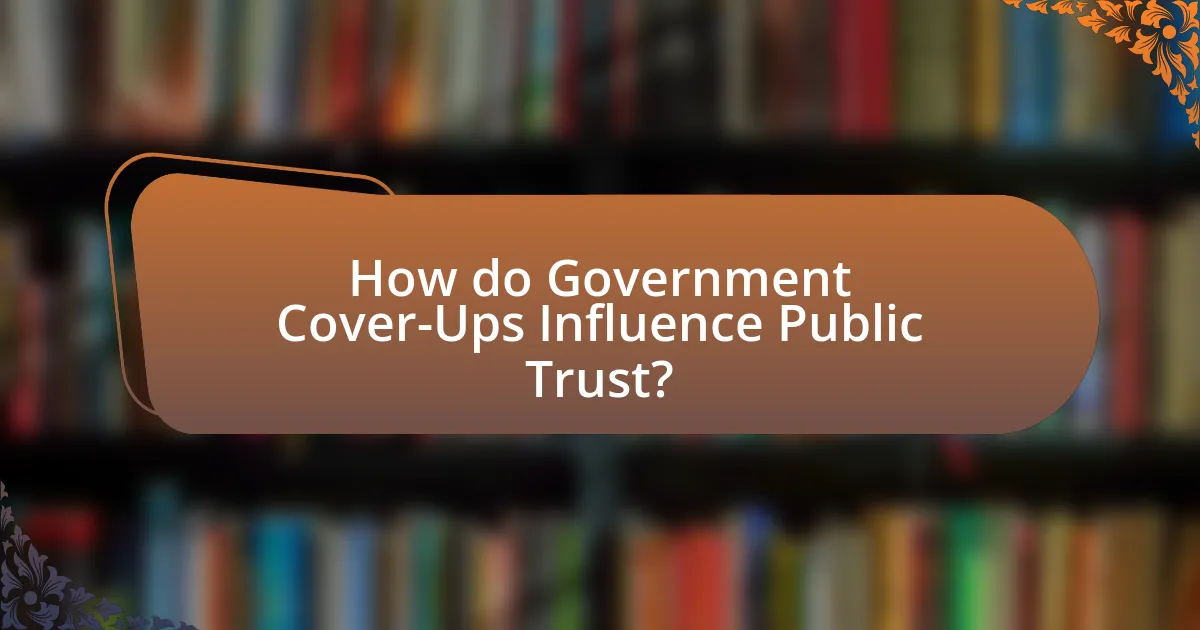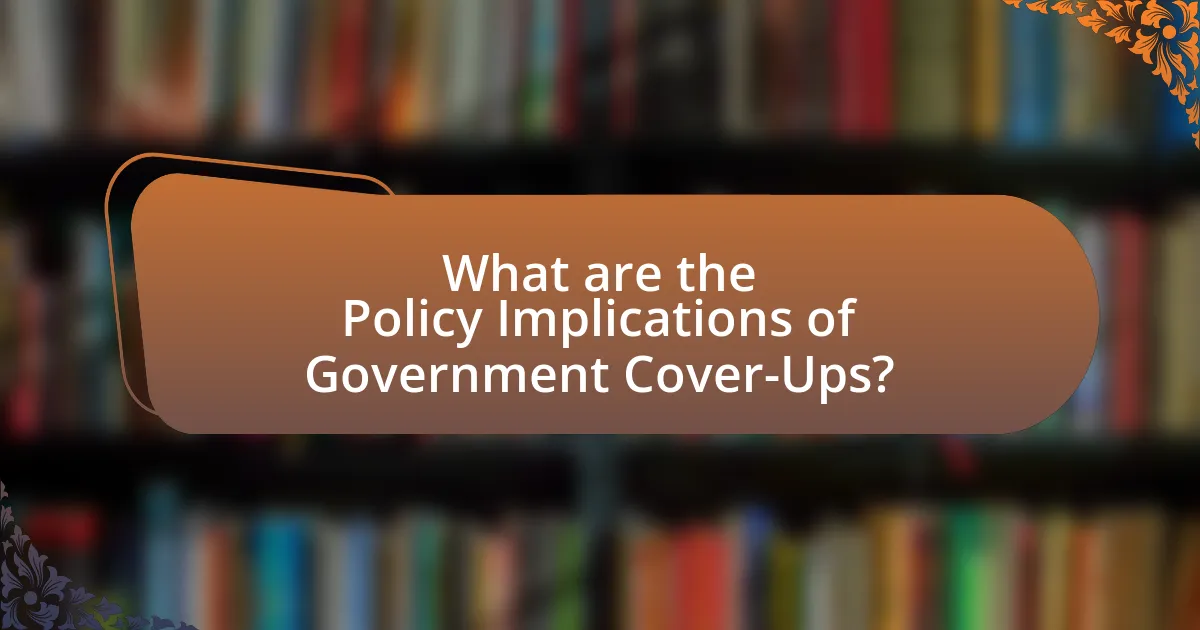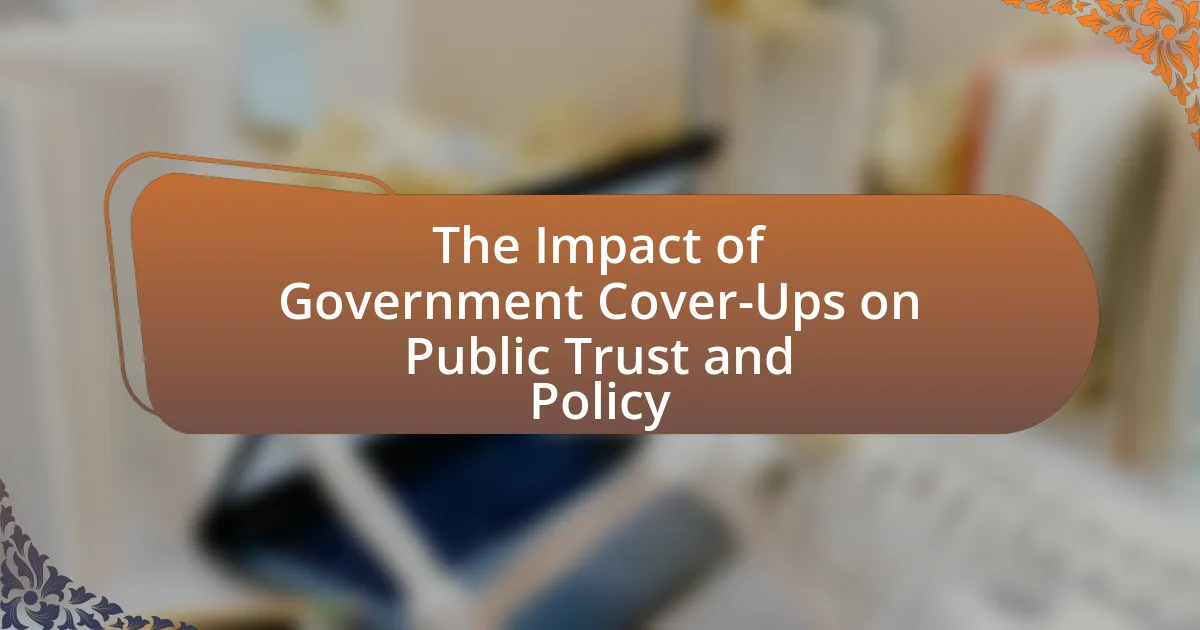Government cover-ups refer to intentional efforts by authorities to hide information or actions from the public, often in contexts such as political scandals, environmental crises, or national security issues. These actions can lead to significant erosion of public trust, as seen in historical examples like the Watergate scandal and the Tuskegee Syphilis Study. The article explores how cover-ups occur, their motivations, the types of information typically concealed, and their implications for public perception and policy-making. It also discusses the role of transparency and accountability in restoring trust, as well as best practices for governments to maintain public confidence.

What are Government Cover-Ups and Their Context?
Government cover-ups are deliberate efforts by authorities to conceal information or actions from the public, often involving significant events or policies. These cover-ups can arise in various contexts, such as political scandals, environmental disasters, or national security issues, where the government seeks to protect its image or maintain control over sensitive information. Historical examples include the Watergate scandal, where the Nixon administration attempted to hide its involvement in a break-in, and the Tuskegee Syphilis Study, where the U.S. government concealed unethical medical practices. Such actions can severely undermine public trust, as citizens may feel deceived or manipulated, leading to skepticism towards government institutions and policies.
How do government cover-ups typically occur?
Government cover-ups typically occur through the deliberate concealment of information by officials to protect interests or maintain control. This process often involves the manipulation of data, suppression of evidence, and dissemination of misleading narratives to the public. Historical examples, such as the Watergate scandal, illustrate how government entities can engage in systematic efforts to hide wrongdoing, leading to significant erosion of public trust. In this case, the Nixon administration’s attempts to cover up its involvement in a break-in at the Democratic National Committee headquarters resulted in widespread skepticism towards government integrity and accountability.
What are the common motivations behind government cover-ups?
Common motivations behind government cover-ups include the desire to maintain national security, protect political interests, and avoid public panic. Governments often prioritize the concealment of sensitive information that could compromise safety or stability, as seen in cases like the Pentagon Papers, where the U.S. government withheld information about the Vietnam War to prevent public dissent. Additionally, political motivations can drive cover-ups, such as protecting the reputation of officials or institutions, exemplified by the Watergate scandal, where the Nixon administration attempted to hide its involvement in illegal activities to preserve its power. Lastly, governments may seek to prevent public panic or unrest, as demonstrated during health crises like the early stages of the COVID-19 pandemic, where information was sometimes downplayed to avoid widespread fear.
What types of information are often covered up by governments?
Governments often cover up information related to national security, public health crises, environmental disasters, and political scandals. For instance, during the Watergate scandal, the U.S. government concealed information about illegal activities by officials, which ultimately eroded public trust. Similarly, in the case of the COVID-19 pandemic, some governments were criticized for downplaying the severity of the virus and withholding data on infection rates, impacting public response and policy decisions. These examples illustrate how the suppression of critical information can significantly affect public perception and trust in government institutions.
Why do government cover-ups matter to the public?
Government cover-ups matter to the public because they undermine trust in institutions and can lead to widespread misinformation. When governments conceal information, it creates a perception of dishonesty and erodes the public’s confidence in their leaders and policies. For instance, the Watergate scandal in the 1970s revealed significant governmental misconduct, resulting in a long-lasting decline in public trust towards the U.S. government. Additionally, cover-ups can hinder accountability and transparency, which are essential for a functioning democracy. The lack of transparency can also prevent informed public discourse, as citizens may not have access to critical information needed to make decisions about policies that affect their lives.
How do cover-ups affect public perception of government integrity?
Cover-ups significantly undermine public perception of government integrity by fostering distrust and skepticism among citizens. When governments engage in concealment of information, such as in the Watergate scandal or the Flint water crisis, it leads to a belief that officials prioritize self-preservation over transparency and accountability. Research indicates that 70% of Americans believe that government officials often lie to the public, which reflects a pervasive sentiment that erodes trust in governmental institutions. This erosion of trust can result in decreased civic engagement and increased public cynicism, ultimately affecting policy compliance and the effectiveness of governance.
What historical examples illustrate the impact of cover-ups on public trust?
Historical examples that illustrate the impact of cover-ups on public trust include the Watergate scandal and the Tuskegee Syphilis Study. The Watergate scandal, which involved a break-in at the Democratic National Committee headquarters and subsequent cover-up by President Nixon’s administration, led to a significant decline in trust towards the U.S. government, culminating in Nixon’s resignation in 1974. Public confidence in government institutions plummeted as citizens felt betrayed by the actions of their leaders. Similarly, the Tuskegee Syphilis Study, where African American men were misled and denied treatment for syphilis to study the disease’s progression, resulted in long-lasting distrust in medical institutions and government agencies among the African American community. This study, which lasted from 1932 to 1972, highlighted the ethical violations and lack of transparency that can severely damage public trust. Both cases demonstrate how cover-ups can erode confidence in government and institutional integrity.

How do Government Cover-Ups Influence Public Trust?
Government cover-ups significantly erode public trust by fostering skepticism and cynicism towards authorities. When citizens discover that their government has concealed information, such as the Watergate scandal in the 1970s, it leads to a perception that officials prioritize self-interest over transparency. This erosion of trust can result in decreased civic engagement and increased public resistance to government policies, as seen in the aftermath of the Iraq War, where misinformation about weapons of mass destruction led to widespread disillusionment with government narratives. Consequently, the long-term impact of cover-ups can destabilize the relationship between the government and its citizens, undermining the legitimacy of public institutions.
What is the relationship between government transparency and public trust?
Government transparency directly enhances public trust by fostering accountability and openness in decision-making processes. When citizens perceive that their government operates transparently, they are more likely to believe that officials are acting in the public’s best interest, which is supported by studies indicating that higher transparency correlates with increased trust levels among the populace. For instance, a 2018 study published in the Journal of Public Administration Research and Theory found that transparency initiatives significantly improved citizens’ trust in government institutions, demonstrating that when information is readily available and accessible, it mitigates suspicion and promotes a sense of security among the public.
How do cover-ups erode trust in government institutions?
Cover-ups erode trust in government institutions by creating a perception of dishonesty and lack of accountability. When governments conceal information or mislead the public, it undermines the foundational principle of transparency that is essential for public trust. Historical examples, such as the Watergate scandal, illustrate how government deception can lead to widespread skepticism and a decline in civic engagement. According to a 2019 Pew Research Center study, 70% of Americans believe that government officials are not honest, reflecting the long-term damage caused by past cover-ups. This erosion of trust can result in decreased public cooperation and increased polarization, further complicating governance and policy implementation.
What role does media play in shaping public perception of cover-ups?
Media plays a crucial role in shaping public perception of cover-ups by influencing the narrative and framing of information. Through investigative journalism, media outlets can expose discrepancies and inconsistencies in official accounts, thereby fostering skepticism among the public. For instance, the Watergate scandal in the 1970s exemplified how media coverage led to increased public awareness and distrust in government, ultimately resulting in significant political consequences. Studies have shown that media framing can significantly affect public opinion, as highlighted in research by Entman (1993), which demonstrates that the way information is presented can alter perceptions and attitudes toward political events. Thus, the media serves as a powerful tool in either reinforcing or challenging public trust in government actions related to cover-ups.
How do citizens respond to government cover-ups?
Citizens typically respond to government cover-ups with skepticism and distrust towards authorities. This reaction is often fueled by a perception that the government is withholding critical information, leading to public outrage and demands for transparency. For instance, the Watergate scandal in the 1970s resulted in a significant decline in public trust in the U.S. government, as citizens felt betrayed by the administration’s attempts to conceal wrongdoing. Additionally, surveys indicate that when citizens believe a cover-up has occurred, they are more likely to engage in protests, seek alternative media sources, and advocate for accountability measures, reflecting a broader trend of civic activism in response to perceived governmental dishonesty.
What are the psychological effects of discovering a cover-up on the public?
Discovering a cover-up can lead to significant psychological effects on the public, including feelings of betrayal, anger, and distrust towards authorities. When individuals learn that they have been misled, their sense of security is often shattered, resulting in heightened anxiety and skepticism about future interactions with government entities. Research indicates that such revelations can diminish public trust, as seen in the aftermath of events like the Watergate scandal, where trust in government institutions plummeted. This erosion of trust can lead to increased civic disengagement and a belief that transparency is lacking, ultimately affecting public policy and governance.
How do cover-ups influence civic engagement and activism?
Cover-ups significantly diminish civic engagement and activism by eroding public trust in government institutions. When citizens perceive that information is being concealed, they often feel disillusioned and skeptical about the motives of those in power, leading to apathy and disengagement. For instance, the Watergate scandal in the 1970s resulted in a notable decline in trust towards the U.S. government, which subsequently affected voter turnout and participation in civic activities. Additionally, research by the Pew Research Center indicates that transparency issues correlate with lower levels of public participation in political processes, as individuals become less likely to engage when they believe their voices will not lead to accountability or change.

What are the Policy Implications of Government Cover-Ups?
Government cover-ups significantly undermine public trust in institutions, leading to long-term policy implications such as increased skepticism towards government actions and reduced civic engagement. When citizens perceive that their government is withholding information or manipulating facts, they are less likely to support policies or initiatives proposed by that government. For instance, the Watergate scandal in the 1970s resulted in a profound decline in trust towards the U.S. government, which influenced subsequent policies aimed at increasing transparency and accountability, such as the Freedom of Information Act amendments. Additionally, cover-ups can lead to a demand for more stringent oversight mechanisms, as seen in the aftermath of the Iraq War, where misinformation about weapons of mass destruction prompted calls for reforms in intelligence and military policy. These examples illustrate that government cover-ups not only erode trust but also catalyze significant shifts in policy frameworks aimed at restoring public confidence.
How do cover-ups affect policy-making processes?
Cover-ups significantly undermine policy-making processes by eroding public trust and distorting the information landscape. When government entities engage in cover-ups, they often prioritize secrecy over transparency, leading to a lack of accountability and informed decision-making. For instance, the Watergate scandal in the 1970s revealed how concealment of information can lead to widespread distrust in government institutions, ultimately resulting in reforms aimed at increasing transparency and oversight. This historical example illustrates that cover-ups can catalyze shifts in policy frameworks, as public demand for accountability grows in response to perceived deception.
What are the long-term consequences of cover-ups on legislation?
Cover-ups can lead to significant long-term consequences on legislation, primarily by eroding public trust in government institutions. When cover-ups are revealed, they often result in a loss of credibility for lawmakers, which can hinder their ability to enact future policies effectively. For instance, the Watergate scandal in the 1970s not only led to the resignation of President Nixon but also resulted in widespread skepticism towards government transparency and accountability, prompting reforms like the Ethics in Government Act of 1978. This historical example illustrates how cover-ups can catalyze legislative changes aimed at restoring public confidence, yet they simultaneously create a lingering distrust that complicates future governance.
How can cover-ups lead to changes in public policy priorities?
Cover-ups can lead to changes in public policy priorities by eroding public trust and prompting demands for accountability and transparency. When a government is involved in a cover-up, it often results in public outrage, which can shift the focus of policymakers towards reforming regulations and enhancing oversight mechanisms. For instance, the Watergate scandal in the 1970s led to significant reforms in campaign finance laws and the establishment of the Federal Election Commission, as the public’s demand for integrity in government increased. This illustrates how the fallout from a cover-up can catalyze legislative changes aimed at restoring public confidence and addressing the issues that allowed the cover-up to occur.
What measures can be taken to prevent government cover-ups?
To prevent government cover-ups, implementing robust transparency laws is essential. These laws should mandate the disclosure of government activities and decision-making processes, thereby holding officials accountable. For instance, the Freedom of Information Act in the United States allows citizens to request access to federal agency records, promoting transparency and reducing the likelihood of cover-ups. Additionally, establishing independent oversight bodies can enhance accountability by investigating allegations of misconduct without government interference. Historical examples, such as the Watergate scandal, demonstrate that public scrutiny and investigative journalism can effectively expose cover-ups, reinforcing the need for a vigilant and informed citizenry.
How can transparency initiatives restore public trust?
Transparency initiatives can restore public trust by providing clear, accessible information about government actions and decisions. When citizens have access to data and insights regarding policies, expenditures, and decision-making processes, they are more likely to feel informed and engaged. For instance, studies have shown that governments that implement open data policies experience increased public confidence; a 2019 report by the World Bank indicated that transparency in public finance management can lead to a 20% increase in citizen trust. By fostering an environment of accountability and openness, transparency initiatives directly counteract the effects of government cover-ups, thereby rebuilding the relationship between the public and governmental institutions.
What role do whistleblower protections play in preventing cover-ups?
Whistleblower protections play a crucial role in preventing cover-ups by encouraging individuals to report misconduct without fear of retaliation. These protections create a safe environment for whistleblowers, which is essential for uncovering unethical practices and holding organizations accountable. For instance, the Whistleblower Protection Act of 1989 in the United States provides legal safeguards for federal employees who disclose information about government wrongdoing, thereby promoting transparency and integrity within public institutions. Studies have shown that organizations with strong whistleblower protections are more likely to detect and address issues before they escalate into larger scandals, thus maintaining public trust and ensuring effective governance.
What best practices can governments adopt to maintain public trust?
Governments can maintain public trust by ensuring transparency in their operations and decision-making processes. Transparency fosters accountability, allowing citizens to understand government actions and decisions, which is crucial for building trust. For instance, the Open Government Partnership, which includes over 75 countries, emphasizes the importance of transparency and citizen engagement in governance, leading to increased public trust and participation. Additionally, regular communication and responsiveness to public concerns can enhance trust, as seen in countries that effectively utilized social media to engage with citizens during crises, such as the COVID-19 pandemic. These practices demonstrate a commitment to openness and accountability, essential for sustaining public confidence in government institutions.
